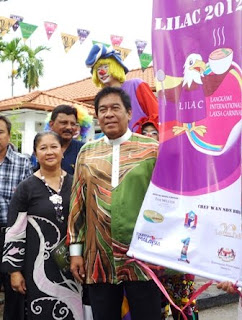Last December the government unveiled a very ambitious Langkawi Tourism
Blueprint (LTB) from 2011 to 2015 aimed at bringing about a major
transformation where the locals will benefit from the developments to its 99
magical islands.
The cable car that takes you up to Gunung Mat Chincang
that gives with a good of view of the west coast of Langkawi
Under the LTB, which was launched by Prime Minister Datuk Seri Najib Tun Razak, the Langkawi Development Authority (LADA) is tasked with overseeing the implementation of 77 initiatives.
Its
target is to woo investments of up to RM5 billion, have three million tourists
and generate a revenue of RM3.8 billion by 2015.
The industry players are all for the
LTB, a master plan which Langkawi badly needs. Langkawi’s rich natural endowments,
which are its key attributes and strengths, can certainly be harnessed more
effectively.
One of the areas recommended in the LTB
is to position Langkawi as a meetings, incentives, conference and exhibitions destination
with emphasis on the island’s assets as a nature and eco-destination.
The clarion call to get the right
people to do the right things to help Langkawi get the buzz back as an
international tourist destination has never been stronger.
Currently, there are about 20 flights
daily bringing in visitors to Langkawi from the Kuala Lumpur International Airport,
Low-Cost Carrier Terminal, Subang and Penang besides charter flights from the
medium and long haul markets.
The Langkawi International Airport is usually busy during
the weekends and school holidays only.
The other access to Langkawi is by ferry from Penang, Kuala Kedah, Kuala Perlis and Satun, which is sited on mainland of southern Thailand, thus making this legendary island to be easily accessible.
The January to May data showed the number
of visitors to Langkawi increasing to 614,000 from 549,000 for the same period
last year while visitor arrivals through the Langkawi International Airport
reported 11% increase for the first five months this year.
Ever since
Langkawi was declared as tax-free destination in 1989, high hopes have been
pinned on it being able to attract more tourists, in particular shoppers, but
this is gradually losing its appeal as more than 300 items much sought after by
tourists have been declared duty free nationwide.
Langkawi is left with the advantage in duty free items for
glassware, chocolates, cigarrette and tobacco, liqueur and beers.
The numerous modern shopping malls in
Kuala Lumpur, Penang, Melaka, Johor Bahru (with the opening of Johor Premium
Outlet) and Kota Kinabalu offering international renowned brands have posed
stiff competition for Langkawi.
 LADA
chief executive officer Tan Sri Khalid Ramli, who has been eight months in
office, assured that the authority had set up a delivery management office to monitor
and keep track of the implementation progress of the initiatives under the LTB.
LADA
chief executive officer Tan Sri Khalid Ramli, who has been eight months in
office, assured that the authority had set up a delivery management office to monitor
and keep track of the implementation progress of the initiatives under the LTB.
“These
initiatives involve various aspects such as connectivity, flight schedules and
matters pertaining to direct flights to the island, transportation and
services, among others.
“Some
are already completed and implemented like the board walks, which have been
developed on several
islands of Langkawi."
While certain investors have committed
to inject significant amounts of money to build new hotels and come up with other forms of offerings,
the existing hoteliers are also pumping more funds to upgrade and rebrand their
products.
Langkawi has many international standard and beautiful
resorts like this one nestle in the tropical rainforest with
manicure landscaping
Seri Cenang Resort & Spa Langkawi’s recent soft opening is expected to place Langkawi within the radar of being an international spa resort destination.
Given
this new sense of hope in the air, good times are expected to return to the
island, which has been left languishing for a few years.
Langkawi
International Laksa Carnival
One of the initiatives by LADA to attract more tourists to the island was through events like the Langkawi International Laksa Carnival (LILAC).
Held from 25-27 May, this inaugural
event featured the famous laksa from Kelantan, Langkawi, Kuala Perlis, Penang,
Sarawak, Johor and Pahang, mainly from Malaysia. Except for the Siamese laksa,
whose origin is from our Thai neighbour but presented by the Kelantanese, there was nothing much very
international about this event.

Laksa, a rice noodle dish served with slightly sour and spicy mashed fish gravy with some variations of its preparations in the different states of Malaysia, was originally a simple village dish. Today, it is popularly featured on the menus of many of the five-star hotels in the country.
Malaysia’s Penang assam laksa has been
voted by CNN as the seventh out of the world’s 50 most delicious food in a
global poll.
Australian-born film actor cum-director Mel Gibson, who considers laksa as one of his favourite food, is said to able to prepare this Malaysian dish.
LILAC suffered the same fate of many local and international events organised in Malaysia, that is,
insufficient public awareness and pre-publicity.
Let me introduce you to "Laksa Sarawak"
The Langkawi International Formula Jet Ski
Super Series, which took place in April, was no better in terms of publicity.
Many tourism industry players from
hoteliers to taxi operators are wondering when will Langkawi be able to be on
par with other resort islands like Phuket, Koh Samui or Bali, in term of
tourists arrivals if not better.





No comments:
Post a Comment